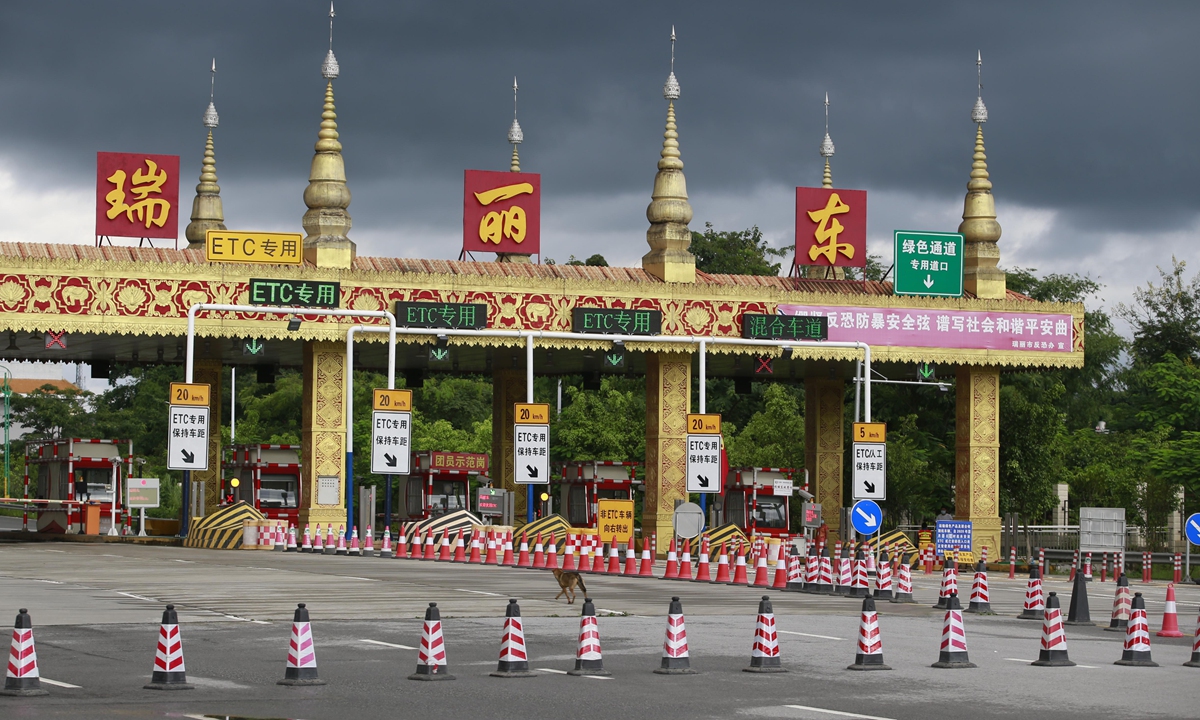Ruili reopens after week-long lockdown, remains cautious at border
By Liu Caiyu and Liu Ruojin Source: Global Times Published: 2020/9/22 21:03:42

The Ruili Dong highway tollbooth Photo: VCG
Seven days of lockdown have ended, bringing Ruili in Southwest China's Yunnan Province back to normal, after two people who illegally crossed the border from Myanmar tested positive for COVID-19 - proving again the effectiveness of China's epidemic prevention measures.
Residents celebrated the end of the lockdown on Monday night by setting off fireworks. On Tuesday, people wearing masks were seen on the streets, restaurants were waiting to welcome guests after disinfection, cargo vehicles prepared to leave the city, and students waited to return to campus.
Local residents in Ruili, which is known for its jade trade and tourism, hailed the "China speed" in the anti-epidemic mission and attributed the success in combating the virus to decisive efforts by the local government, including citywide tests and the lockdown. Ruili lifted its lockdown after more than 280,000 residents tested negative for COVID-19.
However, police stationed on the border will continue 24-hour patrols. Villagers bordering Myanmar are still required to stay at home and loudspeakers in border villages will keep broadcasting anti-epidemic policies and warnings about illegal behavior in Chinese and Burmese.
A police officer in a border station in Ruili surnamed Xu told the Global Times on Tuesday that checkpoints have been set up every 100 meters along the border. The pressure of border patrol is huge, Xu said, since his station has only 20 officers who will be on duty in turns every 12 hours. Some militiamen are helping them in patrols.
Local border police must also crack down on drug-related crimes, as the drug business is prevalent in border areas, according to the officer.
"Illegal border crossings are strictly monitored by police officers. I can assure you that no one could cross the border in this region where the territories of Myanmar and China are only separated by a boundary river," Xu said, joking that "not even a mosquito could fly over!"
On Tuesday, many vehicles lined up on the cargo route to Myanmar that was closed during the lockdown, as the number of inbound and outbound vehicles is expected to double on the day.
After the anti-epidemic experience in Beijing, Dalian, Xinjiang and now Ruili, the Chinese way of epidemic control has proven effective.
"The all-out efforts that Ruili made enables us to return to normal life in just a week," a jade businessman surnamed Jiang told the Global Times. Some local jade markets reopened on Tuesday on the premise of strict anti-epidemic measures including showing negative nucleic acid tests and normal body temperatures before entering the market, Jiang said.
However, the Global Times learned from several local hotels that many tourists cancelled their reservations, including for the golden week of the National Day holidays starting October 1.
One hotel manager in Ruili said many tourists are taking a wait-and-see attitude. According to the Ruili government, a negative nucleic acid test will be required to leave the city from Tuesday until October 10.
Tourism industry observers said the epidemic in Ruili is a blow to local tourism, but it won't have a huge impact on the overall tourism industry of Yunnan.
The National Day and Mid-Autumn Festival holiday is expected to be the travel peak of the year. Lijiang and Dali, both tourist attractions in Yunnan, are among the top 10 tourism destinations for Chinese visitors, a spokesperson from online travel agency Lvmama told the Global Times.
As a preparation for the holiday, some hotels in Lijiang and Dali have taken disinfection measures and obtained medical supplies such as thermometers.
Major scenic spots in Yunnan said they would do a good job in epidemic prevention, testing and crowd diversion during the National Day holidays. Some scenic spots will only open to tourists by appointment.
Posted in: SOCIETY